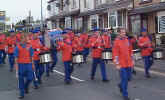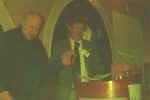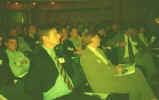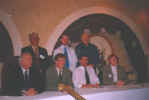|
Facing Reality, Facing Responsibilities: Marching Bands in the 21st Century |
||||||
|
Ulster Bands’ Association Conference 2002, Broughshane, Co Antrim. In recent years, Ulster’s marching bands have received a lot of bad publicity. They have been accused of trouble-making, trampling over people’s rights, and various forms of anti-social behaviour. Some criticism has been deserved, but much of it has been very unfair – if not maliciously and politically motivated. Clearly, something needs to be done to set things straight. This is the thinking behind the Ulster Bands’ Association – an umbrella group for marching bands from the Protestant, unionist and loyalist tradition. On Saturday, November 23rd, the Association hosted a conference to examine the way forward for such bands in the face of the challenges it faces in the coming years. Kilkeel man Maynard Hanna, from the British Cultural Forum, chaired the conference. He spoke of the problems facing bands and called for them to confront their problems and improve their public image. "Band parades ought not only to survive but prosper!" He told the conference that band members ought to be positive, as the product is good and there is a readymade audience. The future, he said, begins with the Association’s members. Lord Laird of Artigarvan, the Chairman of the Ulster-Scots Agency, praised Ian McAfee and others in the Ulster Bands’ Association for their efforts in promoting the culture of marching bands. The Ulster-Scots Agency has worked to promote Ulster-Scots culture, heritage, language and identity. It had helped to fund today’s conference. "We’re only at the dawn of day of the Ulster-Scots revival – the fasted growing cultural revival in Europe." Ulster-Scots culture, he said, was a ‘fun culture’. It had a big impact on the world’s history. It had a vast panel of famous figures. The celebration of this culture is not offensive and ought not to be a cause for offence. The Agency is in dispute with the BBC over its negative attitude to Ulster-Scots culture and identity. He recognised talent in the ranks of the Ulster Bands’ Association. Lord Laird has a background in Public Relations where he learned that: "if somebody doesn’t understand you, it’s your fault." His message to the marching bands was clear. We must communicate who and what we are. The Ulster-Scots Agency will give support wherever it can. We’re at the dawning of a new age for a movement whose time has come! Ian McAfee, the Chairman of the Ulster Bands’ Association, referred to the recent Quigley Report on parades. Sir George Quigley met the Association on April 23rd after receiving a submission from them. Seven pages in his report were devoted to marching bands. Mr McAfee was impressed that Quigley was prepared to meet, listen and understand band culture. Quigley has brought new encouragement to the Association and bands in general. Bands have made mistakes. "Any mistake in this media conscious age can reflect badly on the public." Those in the band community must be prepared to listen to people’s worries and to explain themselves. They must strive to improve their image. Change is needed. The Ulster Bands’ Association Code of Conduct is a way to improve the bands’ PR image. "We and others must face reality and our responsibilities." Quigley "cannot be ignored or wished away." Marching bands are the strongest form of community arts in Ulster. They are voluntary groups. Bands are often the source of young people’s musical literacy. Bands are a source of home grown musical talent. They are very individual in style. No two bands play a tune exactly alike. Each is distinctive. Band parades are essentially community events. There is strong public support for well-organised parades. The Ulster Bands’ Association encourages interaction with the community, but there are those who will never change their hostile attitude. Mr McAfee concluded that help is needed for bands to further their community responsibility. Amanda Cooke, the PSNI Parades Liaison Officer with the Parades Commission gave a PowerPoint presentation on the legal position of parades under the Public Processions Act 1998. This Act of Parliament sets out the remit of the Parades Commission and the Secretary of State for Northern Ireland. Police had to make their own decisions prior to this act, which set up the Parades Commission. Now the PSNI have to police Parades Commission decisions. Bands have to submit their Form 11/1 to the Police who will forward it on to the Parades Commission. The person signing the form takes responsibility for the band’s behaviour. Ms Cooke gave some interesting insight into the PSNI’s role in policing parades. ‘Contentious’ is a label applied to only 300 or so out of a total of 3,000 plus parades each year. When policing a parade, the PSNI look at recent parade history, previous problems, notice of protests, the impact on community relations and ‘human rights’ issues. Fourteen days’ notice is needed for organised protests against parades. Unlike parades, this is still the responsibility of the police, not the Parades Commission. The PSNI polices protests under the Public Order Order (NI) 1987. Interference with a lawful parade is a criminal offence. Ms Cooke claimed that 90-95% of problems at band parades was due to alcohol. Nobody disagreed with her. Ms Cooke then took a number of questions from the floor. My impression was that she was genuinely interested in facilitating as many parades as possible with the minimum of disruption or public disorder. She seemed eager to prevent band secretaries from plunging into legal minefields when ever they organise a band parade. Rev Stephen Dickinson, from the Grand Orange Lodge of Ireland, came with a message of solidarity. "We’re with you for all that you do in celebrating our cultural traditions." Indeed, band tradition has an essential part to play in Ulster culture. Rev Dickinson "… can appreciate all styles including ‘blood and thunder’ bands" and the Orange Order and marching bands have much to complement one another. Bands help to instill a sense of pride and thankfulness. The Orange Order, according to Mr Dickinson, is "encouraged by the Association’s achievements and commends all it does" - especially the Code of Conduct. Rev Dickinson thought that there are some difficulties – alcohol abuse, some foul language and paramilitary trappings – that need to be addressed by the bands. Still, he said, the Orange Order is behind the Association. Much criticism of bands is unfair. "We are interwoven with you and will offer support. Do what we do do well." This reporter got the impression that GOLI sent Rev Dickinson to tickle the bandsmen’s chins, pat them on the heads and give them precisely nothing. As far as we know, no help to finance the conference came from GOLI. All the Association got was kind words. No acknowledgement was given of the Orange Order’s perceived tendency to treat bands with some disdain – never mind an apology. Quite a few bandsmen I spoke to in the lunch break shared this impression. The Orange Order needs to examine its own relationship with marching bands and mend its ways too. After all, the majority of the people who come out to see the parades on the Twelfth and other days don’t come out to see the brethren – they come out to see the bands. Rev Dickinson and his fellow Grand Lodge members would do well to remember that the ‘interweaving’ he spoke of so eloquently works both ways. Will Glendinning of Diversity Challenge – a group of which I know nothing – commended the Ulster Bands’ Association for the leadership it seeks to give to marching bands. Diversity Challenge was another funder of the conference. He put the onus on the Association to accentuate the positive face of the Ulster marching band tradition and to recognise and try to eliminate the negative. Criticism, he said, can be valid, depending on how it can be dealt with. He outlined what he saw as the positive and the negative aspects of the tradition. On the positive side, marching bands are very important locally in the Protestant, unionist, loyalist tradition. They are a great expression of cultural identity; one of the best youth movements in Northern Ireland – a critical part of popular youth culture. Parades promote healthy competition between bands and towns and instil pride in walking down one’s own streets. On the negative side, there is first of all, the problem of crowd control when large numbers of folk come on to the streets. Of course, Mr Glendinning observed, this is not unique to band parades. It is also true, for example, of sports gatherings. Alcohol abuse by band members and spectators with its associated vomiting and urinating in public places causes much annoyance – even within the same community. Again, as our society is not monocultural, the presence of paramilitary trappings and slogans can cause offence to many. As Mr Glendinning put it, "Bands that ask for respect must give respect. What does a UDA or LVF or UVF symbol give out to victims of that organisation? Not culture and identity but abuse." He referred to the Ballymoney band parade earlier this year. This was a family fun day with re-enactments and no alcohol abuse. It had a relaxed atmosphere. Yet, four bands marred this by displaying overt paramilitary symbols. This shows that there is still work to be done. Yes, he acknowledged that this kind of thing doesn’t run only the one way, but Ulster bands have the responsibility to deal with their own house. It is to the credit of the band members present that they took this constructive criticism on board and applauded Mr Glendinning. He at least took them seriously enough not to patronise them and tell them what he thought they wanted to hear. It seems to me that the Ulster Bands’ Association is not going to allow marching bands and their culture and traditions to be put down any longer. They are not resigned to hiding in cultural ghettoes or to moan to one-another about not being understood, nor will they bury their heads in the sand and pretend that everything is all right and any problems are always someone else’s fault. This may have been how it was in the past but not now! The extensive range of workshops in the afternoon show their determination to see this thing through. They are prepared to make the world sit up and take notice. The effects of this conference will have favourable repercussions for the future of the marching band culture in Ulster for years to come. David Kerr |
|
Pictures from the conference.
|
||||
|
|
||||||
|
|
||||||
|
|








